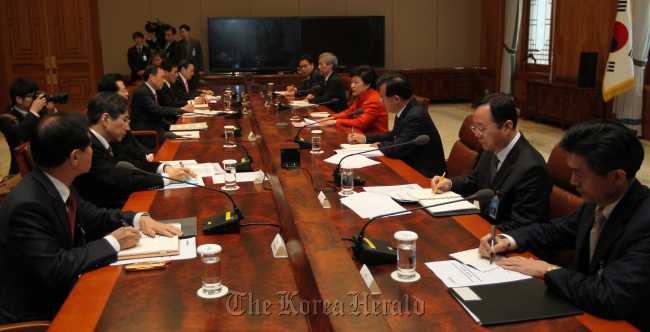President falters on first steps
Assembly impasse casts doubt over stable state administration
By Korea HeraldPublished : Feb. 27, 2013 - 20:50
As the fanfare over the Park Geun-hye administration’s inauguration dies down, what is left is deep political confrontation, a government still not formed and a void in state administration at a time of critical security and economic threats.
Park presided over the first presidential meeting of senior secretaries on Wednesday. But visibly absent was Kim Jang-soo, the head of the newly formed National Security Office, while 10 chief secretaries on state planning, politics, economy, foreign affairs and others sat together for the first time.
“It is of deep concern and regret that the control tower of security could not even attend the first meeting of senior secretaries, due to a delayed government reorganization bill, at a time when security is threatened following North Korea’s nuclear test,” Park said in an opening remark.
Park presided over the first presidential meeting of senior secretaries on Wednesday. But visibly absent was Kim Jang-soo, the head of the newly formed National Security Office, while 10 chief secretaries on state planning, politics, economy, foreign affairs and others sat together for the first time.
“It is of deep concern and regret that the control tower of security could not even attend the first meeting of senior secretaries, due to a delayed government reorganization bill, at a time when security is threatened following North Korea’s nuclear test,” Park said in an opening remark.

The delay is caused by Assembly deadlock over the role of the Future Planning and Science Ministry in broadcasting-related policies, as both main parties continue to scale up their offensives and appeal to the public.
The impasse has delayed the official designations of secretarial posts based on the reorganized presidential office, which is included in the revised Government Organization Act.
Ministers-designate appointed to new bodies and positions also remain sidelined, such as the deputy prime minister for economy and ministries for future planning and science, industry and commerce and maritime affairs and fisheries.
On this account, state administration is being held hostage, as the members of the former Lee Myung-bak administration and the new Park government are forced into an uncomfortable overlap.
Uncertainties are growing on economic policies due to the vacancy of the deputy prime minister, while security remains unresolved as the formal appointment of the national security office chief, who also heads the National Security Council, is put off.
Designation of duties remains in the air at the Foreign Affairs Ministry as well, whose trade section is to be merged with the Ministry of Industry and Commerce. The ministry, for instance, is yet to appoint an ambassador to lead the negotiation of the Korea-U.S. defense spending pact that expires at the end of this year.
“There is high possibility that the first Cabinet meeting next Tuesday to be presided by the president will not be held,” Cheong Wa Dae spokesman Yoon Chang-jung told reporters.
As concerns grew over the protracted delay, Park urged the opposition to make concessions.
“It is hoped that the National Assembly can swiftly pass (the government bill) including that for the Ministry of Future Planning and Science that aims to focus on reviving the economy through convergence.”
But even some members of the ruling Saenuri Party express concern that a compromise on the government plan may be necessary.
“The transition committee did not even gather views from the ruling party as they rushed to prepare the new government plan. The party leadership must not only be able to persuade the opposition but also the president. If the Saenuri Party fails to do its job in time, the opposition will come to ignore the ruling party and directly demand the president to make the decision,” former Saenuri Party leader Rep. Chung Mong-joon said at a party meeting.
Observers expressed concern that the delayed normalization of the new government could be more costly than expected.
“Because Park won the election last year by persuading the voters that her administration would be more stable than her progressive rival Moon Jae-in, the negative impact caused by the delays will be far worse than previous administrations (that suffered setbacks at the beginning),” said politics professor Yoon Seong-yi of Kyung Hee University.
Yoon explained that the protracting confrontation may derive from Park’s leadership style.
Park, who entered politics in 1998, rose to become the party’s core leader by repeatedly steering it through moments of crisis, such as the surprise turnaround in the 2004 general election after suffering rock-bottom public approval ratings.
“Because her leadership was based on challenges by seizing victories in confrontations against the opposition party, her leadership experience lacks in solving issues through negotiation,” he said.
“Park has overlooked any address on how she will solve issues with the opposition in her inauguration speech. It is worrisome that Park may be viewing the opposition as an easy target.”
The last-remaining sticking point is the transference of broadcasting related issues to the Future Planning and Science Ministry from the Korea Communications Commission as part of the convergence plan.
The main opposition Democratic United Party remains resolute against the idea, saying that such a move will damage the independence of broadcasting. It has so far offered an alternative to transfer only the promotion aspect of the broadcasting policies to the ministry, and maintain the licensing rights within the KCC.
By Lee Joo-hee (jhl@heraldcorp.com)
-
Articles by Korea Herald



















![[Today’s K-pop] Treasure to publish magazine for debut anniversary](http://res.heraldm.com/phpwas/restmb_idxmake.php?idx=642&simg=/content/image/2024/07/26/20240726050551_0.jpg&u=)